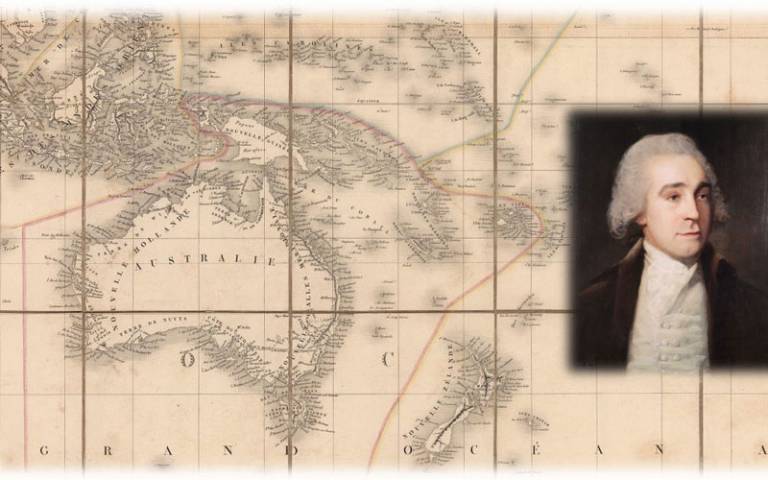Conviction Politics: a digital history of the convict roots of Australian democracy
30 April 2019, 5:30 pm–7:30 pm

A conference hosted by the Bentham Project, UCL Faculty of Laws, in association with UCL History
Event Information
Open to
- All
Organiser
-
Bentham Project - Tim Causer
Location
-
Lecture Theatre LG17UCL Laws, Bentham House, Endsleigh GardensLondonWC1H 0EG
A seminar to be given by Associate Professor Tony Moore (Monash University and Visiting Academic at the Bentham Project, UCL Laws)
Few realise that transportation was a common punishment for protest, agitation, rebellion, dissent and riot directed against the British Crown and others in authority. In all, approximately 3,600 political prisoners were transported. They included the machine-breaking Luddites; 500 rural Swing Rioters from southern England; the Tolpuddle Martyrs who formed one of the first agricultural trade unions in 1834; Canadian and American insurgents from the 1837-39 revolutions in the colonies of upper and lower Canada; the Chartists from 1839 to 1848; Maori and Khoi resistance fighters; and over 2,000 Irish rebels from 1798 to 1868, such as the United Irishmen, Young Irelanders and the Fenians. Transported radicals became celebrated martyrs venerated by their political movements back home, and they left a mark on the emerging political culture of the Australian colonies, spearheading a rebellion in the infant colony of New South wales, and later agitating for constitutional, industrial and land reform, producing newspapers and pamphlets and even assuming office in colonial governments and unions.
This seminar will draw on Tony Moore’s monograph Death or Liberty, and the television documentary of the same name to explore the place of transportation in a radical, transnational public sphere linking liberal, labour and anti-colonial political movements in the UK, Ireland and Canada with the early advancement of democracy and workers’ rights in the Australian colonies. Special attention will be given to Conviction Politics, a new international digital history project led by Moore, drawing on coded archives to map, and communicate to the public, patterns of collective resistance by the mass of ordinary convict workers and the political activity of transported protestors and rebels. To understand the contribution of the convicts to Australian political and social democracy it is necessary to move beyond a narrow national focus for a transnational lens that captures the mobility of people, ideas and media within and beyond the British Empire, not least the involuntary journeys of the exiled radicals.
The ideas of Jeremy Bentham were influential in this reform programme. Notable political prisoners played a key role in the anti-transportation movement, drawing on Bentham’s critique of transportation to strengthen a successful campaign for its cessation, hastening responsible and representative self-government in the eastern colonies. Chartist leaders transported for treason were vocal critics of labour exploitation and lack of political rights in the colonies, and the achievement of manhood suffrage and most of the Chartists' ten points in New South Wales and Victoria by the 1860s owes much to the influence of Bentham’s work on democracy.
A significant stream of the radicals transported to Australia were intellectuals and journalists, orators and publishers, who used the new media of their day to communicate ideas such as freedom of speech and assembly, strength in unity, working class rights and national self-determination. The seminar will discuss Conviction Politics’ innovative use of digital online ‘transmedia’ to communicate its research into these still potent ideas to a wide audience. As well as hosting 100 short video stories, the transmedia hub curates in one place a diversity of protest media (songs, stories, cartoons, banners poetry, badges, posters, novels, memoirs); international archival collections; and materials for a travelling digital exhibition.
Associate Professor Tony Moore is head of Communications and Media Studies in the School of Media, Film and Journalism at Monash University and was formerly Director of its National Centre for Australian Studies. He is a cultural historian, with research interests in media history, Australian popular culture, artistic bohemia, youth subcultures, cultural economy, class, convicts and radical politics. Tony’s recent books include the critically acclaimed Dancing with Empty Pockets: Australia’s Bohemians Since 1860 (Pier 9/Allen & Unwin 2012) and Death or Liberty: rebels and radicals transported to Australia 1788 – 1868(2010), adapted as an award-winning television documentary screened in Australia and Ireland. Tony is a visiting academic at the Bentham Project, UCL, supported by a Bicentennial Fellowship awarded by the Menzies Australia Institute, King's College London. Prior to academia Tony enjoyed careers as a documentary maker at the Australian Broadcasting Corporation and as commissioning editor at Pluto Press and Cambridge University Press. He currently leads the Australian Research Council projects Fringe to Famous: contemporary Australian culture as an innovation system and the Australian–Irish–British digital history Conviction Politics: the roots of Australian democracy.
Please direct any enquiries about this event to Tim Causer.
 Close
Close

